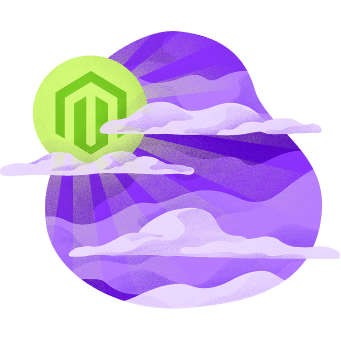Magento Commerce Cloud is a managed hosting platform for the Magento Commerce software offered as a PaaS (platform as a service) by Adobe. It provides a pre-provisioned infrastructure with technologies like PHP, MySQL, RabbitMQ, Redis, and Elasticsearch, and a git-based development workflow.
Layers of Magento Commerce Cloud
Magento Commerce Cloud comprises five functional layers that play an essential role in making the platform robust, scalable, and reliable.
Cloud infrastructure
Amazon Web Services and Microsoft Azure-based cloud servers support Magento Commerce Cloud infrastructure. They provide it with high-performance computing, storage, and networking servers capable of scaling with an enterprise-level company’s demands.
Platform as a service
Git and Composer together power the management, development, and deployment of code for Magento websites. Composer is used for managing the software’s dependencies, upgrading packages, and providing context about what they do and how they fit together. Git, on the other hand, is responsible for managing all code, building, and deploying Magento Commerce Cloud websites.
Commerce functionality
All commerce functionality is delivered by the Magento Commerce software that makes up the heart of all stores. It also provides advanced business intelligence and B2B features that aren't available in the open-source version.
Performance tools
Magento Commerce Cloud includes access to New Relic, which helps developers and system administrators manage, monitor, and troubleshoot its applications and infrastructure. New Relic for application performance management is a software analytics product that can monitor store transactions, database queries, application dependencies, and evaluate performance.
Edge cloud platform
All Magento Commerce Cloud stores use Fastly for secured and optimized content delivery. Fastly works as a content delivery network, web application firewall, as well as an image optimizer to boost performance.
Magento Commerce Cloud plans
Magento Commerce Cloud is available in two different plans — Starter and Pro. Both plans include an architecture that deploys databases, web servers, and caching servers across multiple environments to enable end-to-end testing and supports continuous integration. However, each plan has a unique architecture that drives its development and deployment process.
Here are some salient features of both plans.
Core features
Both plans come with all Magento 2 core features by default. In addition to the default features, they have the PayPal Onboarding tool and Magento Business Intelligence making it simpler to analyze data and monitor business health.
The Pro plan comes with the B2B module that streamlines quote management, price negotiation, enables management of buying roles and creating complex organizational structures. However, those on the Starter plan can purchase the B2B module as an add-on for an additional fee.
Infrastructure and deployment
Both plans come with continuous cloud integration tools capable of supporting an unlimited number of users. They also come with Fastly CDN, image optimization, and additional security using a web application firewall service for production environments.
New Relic for application performance management is available to both plans. However, the New Relic Infrastructure and log management features are limited to the Pro plan. The Pro plan also comes with infrastructure as a service through dedicated virtual infrastructures for production and staging environments.
High availability infrastructure
Unique to those on the Pro plan, high availability architecture is available for the Magento Commerce Cloud with a three-server setup that’s extremely reliable and perfect for enterprises with high demands.
Dedicated hardware
Those on the Pro plan also get dedicated hardware to support their infrastructure. Dedicated hardware and isolated resources deliver enterprise-grade performance, reliability, and availability.
Support
Both plans receive 24x7 monitoring and email support for the cloud infrastructure as well as the core application. However, those on the Pro plan are assigned a dedicated technical advisor. These advisors assist merchants with technical account management from when their subscription begins until their website’s launch.
Magento Cloud CLI
Magento Commerce Cloud has a command-line interface called the Magento Cloud CLI that can be installed on a local workstation to implement features of the Project Web Interface. It provides developers and system administrators with an advanced management interface on their local workstations to perform routine and automated tasks.
As Magento Commerce Cloud environments are read-only, a local development environment allows writing and testing code before pushing to an integration environment for further testing before deployment. Development environments can be made using docker containers or by creating a local virtual machine to clone and branch a project.
Magento Commerce Cloud uses the ece-tools package to manage and deploy cloud projects. The ece-tools are a set of scripts and tools that simplify many Magento Commerce Cloud processes, including deploying to docker environments, managing crons, and applying patches and hotfixes.
Enterprise-level features and a highly scalable environment capable of supporting continuous development and deployment make Magento Commerce Cloud an ideal choice for big enterprises.

